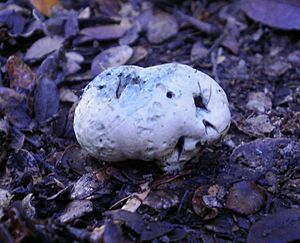Chamonixia facts for kids
Quick facts for kids Chamonixia |
|
|---|---|
 |
|
| Chamonixia pachydermis in beech forest in New Zealand | |
| Scientific classification | |
| Kingdom: | |
| Division: | |
| Class: | |
| Order: |
Boletales
|
| Family: |
Boletaceae
|
| Genus: |
Chamonixia
Rolland (1899)
|
| Type species | |
| Chamonixia caespitosa Rolland (1899)
|
|
| Species | |
|
C. albida |
|
Chamonixia is a special group of fungi that look a bit like truffles. These fungi belong to the family called Boletaceae. You can find Chamonixia all over the world, especially in places with mild weather, known as temperate regions. There are eight different types, or species, of Chamonixia.
Contents
What is Chamonixia?
Chamonixia is a genus of fungi. A genus is a group of closely related living things. These fungi are often called "truffle-like" because they grow underground. They are part of the large fungi kingdom.
Where Does Chamonixia Live?
Chamonixia fungi are found in many different places around the world. They especially like temperate regions. These are areas with mild climates, not too hot and not too cold. This wide spread means they can adapt to various environments.
Who Discovered Chamonixia?
The Chamonixia genus was first described in 1899. It was named by a French scientist named Léon Louis Rolland. He was a mycologist, which is someone who studies fungi. When a scientist "circumscribes" a genus, it means they officially define and name it.
What Kinds of Chamonixia Are There?
There are eight known species of Chamonixia. Each species is a unique type of this fungus. Here are some of the different kinds:
- C. albida
- C. bispora
- C. brevicolumna
- C. caespitosa
- C. caudata
- C. mucosa
- C. octorugosa
- C. pachydermis
- C. vittatispora
See also
 In Spanish: Chamonixia para niños
In Spanish: Chamonixia para niños
 | Lonnie Johnson |
 | Granville Woods |
 | Lewis Howard Latimer |
 | James West |

